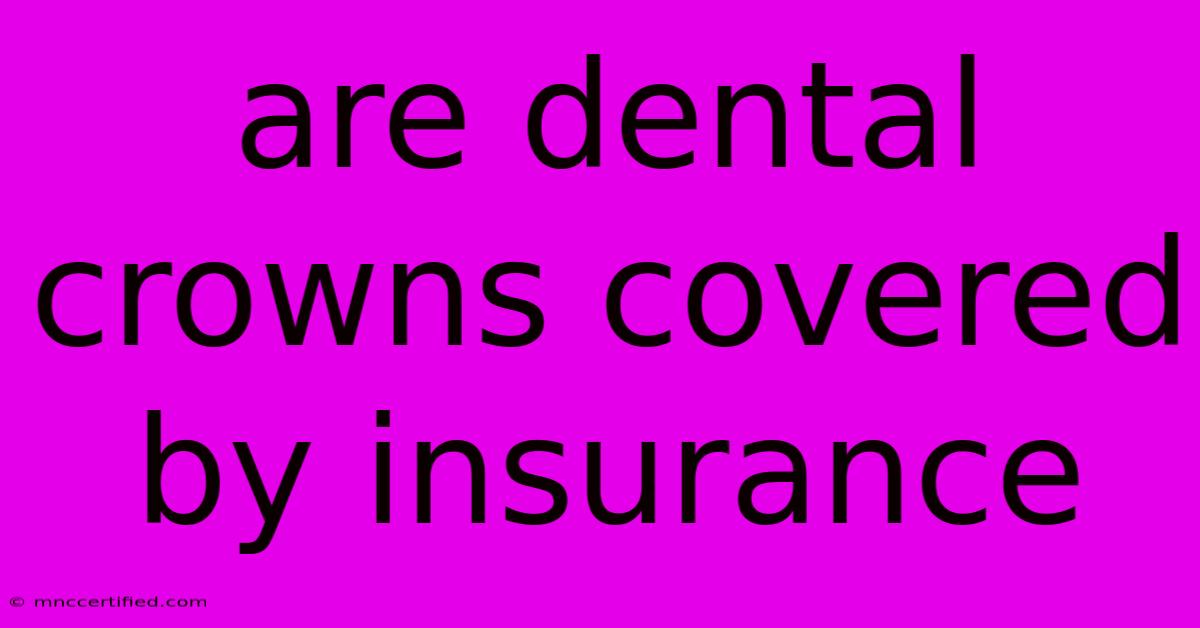Are Dental Crowns Covered By Insurance

Table of Contents
Are Dental Crowns Covered by Insurance? A Comprehensive Guide
Dental crowns are a common restorative treatment that can save your teeth and improve your smile. But if you’re considering getting a crown, you might be wondering: is it covered by my dental insurance?
The answer isn't simple. Coverage for dental crowns varies greatly depending on several factors, including:
- Your insurance plan: Every dental insurance plan has its own set of coverage rules.
- The reason for the crown: Some plans cover crowns for restorative purposes, like fixing a cracked tooth, while others may only cover them for cosmetic reasons.
- Your deductible and co-pay: You may need to pay a deductible and co-pay before your insurance kicks in.
- Your provider's network: Your insurance plan may only cover crowns from providers within its network.
Here's a breakdown of what you need to know about dental crown coverage:
What are Dental Crowns?
Dental crowns are tooth-shaped caps that cover damaged or weakened teeth. They are often used to:
- Protect a weakened tooth: If a tooth has a large cavity, a crown can strengthen it.
- Restore a broken tooth: A crown can fix a chipped or broken tooth.
- Cover a tooth after a root canal: A crown helps to protect a tooth that has had a root canal.
- Improve the appearance of a tooth: A crown can be used to change the shape, size, or color of a tooth.
How Does Dental Insurance Coverage Work for Crowns?
First, you'll need to check your insurance plan's coverage details. Your plan will likely outline:
- Annual maximum: This is the total amount your insurance will pay for dental care in a year.
- Deductible: This is the amount you must pay out of pocket before your insurance starts covering costs.
- Co-insurance: This is the percentage of the cost of the crown you'll pay after meeting your deductible.
- Coverage for crowns: The plan will specify what types of crowns are covered and under what circumstances.
Some plans may have specific limits:
- Number of crowns: Your plan might limit how many crowns you can get per year or lifetime.
- Types of crowns: Some plans may only cover basic crowns, while others might cover more expensive types like gold or ceramic crowns.
- Reason for the crown: Your plan might only cover crowns for restorative reasons, not cosmetic.
How to Find Out Your Coverage
- Contact your insurance company directly. The easiest way to know your coverage is to talk to your insurer.
- Review your policy documents. Your policy booklet should have a section on coverage for crowns.
- Ask your dentist. Your dentist can also help you understand your insurance plan and what you can expect to pay for a crown.
Tips for Maximizing Insurance Coverage
- Choose a dentist in your plan's network. This can save you money on your out-of-pocket costs.
- Get pre-approval from your insurance company. This can help you avoid surprises about coverage and costs.
- Ask about financing options. Some dentists offer payment plans or financing options to help you afford the cost of a crown.
Conclusion
Understanding your dental insurance coverage for crowns can help you make informed decisions about your oral health. While there are no guarantees, knowing the intricacies of your policy can make the process smoother and help you plan for any costs. Remember, your oral health is essential, and a crown can be a valuable investment.

Thank you for visiting our website wich cover about Are Dental Crowns Covered By Insurance. We hope the information provided has been useful to you. Feel free to contact us if you have any questions or need further assistance. See you next time and dont miss to bookmark.
Featured Posts
-
Home Insurance Cost For Milton Florida
Nov 09, 2024
-
Does Force Placed Insurance Cover Roof
Nov 09, 2024
-
Does Reckless Driving Affect Insurance
Nov 09, 2024
-
Jack Daniels Bonded Tennessee Whiskey
Nov 09, 2024
-
Who Accepts Paramount Dental Insurance
Nov 09, 2024